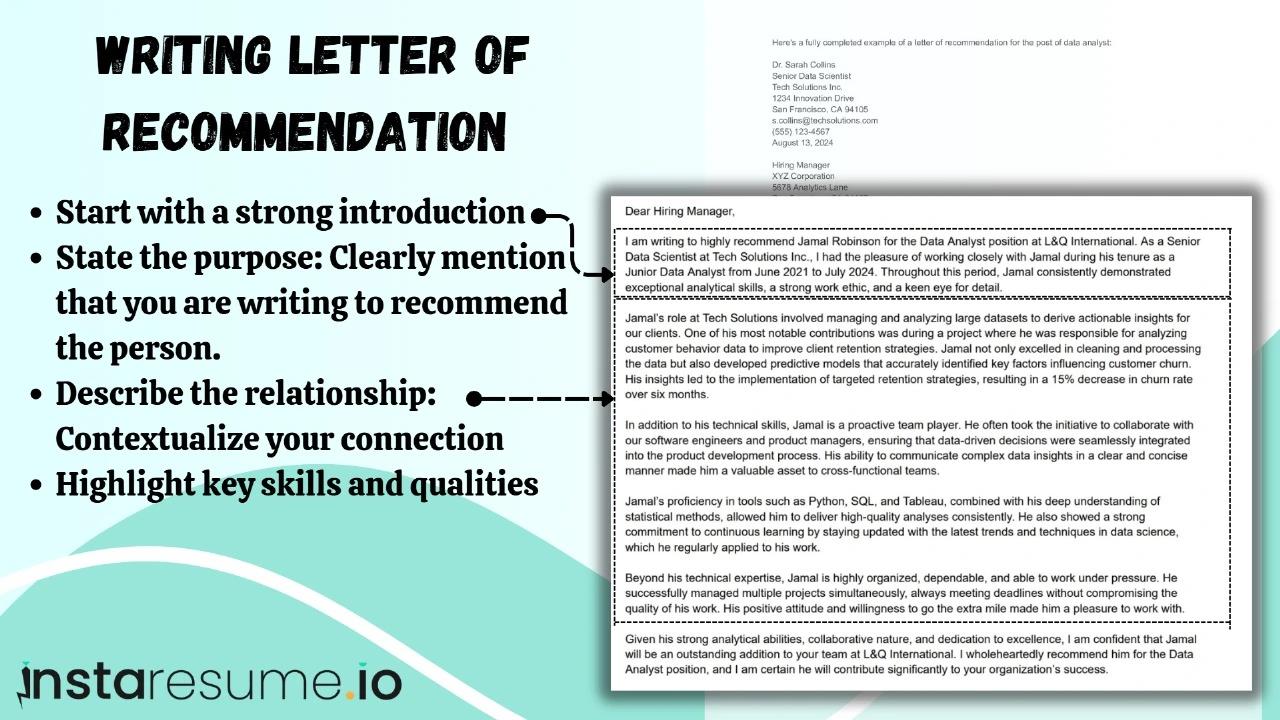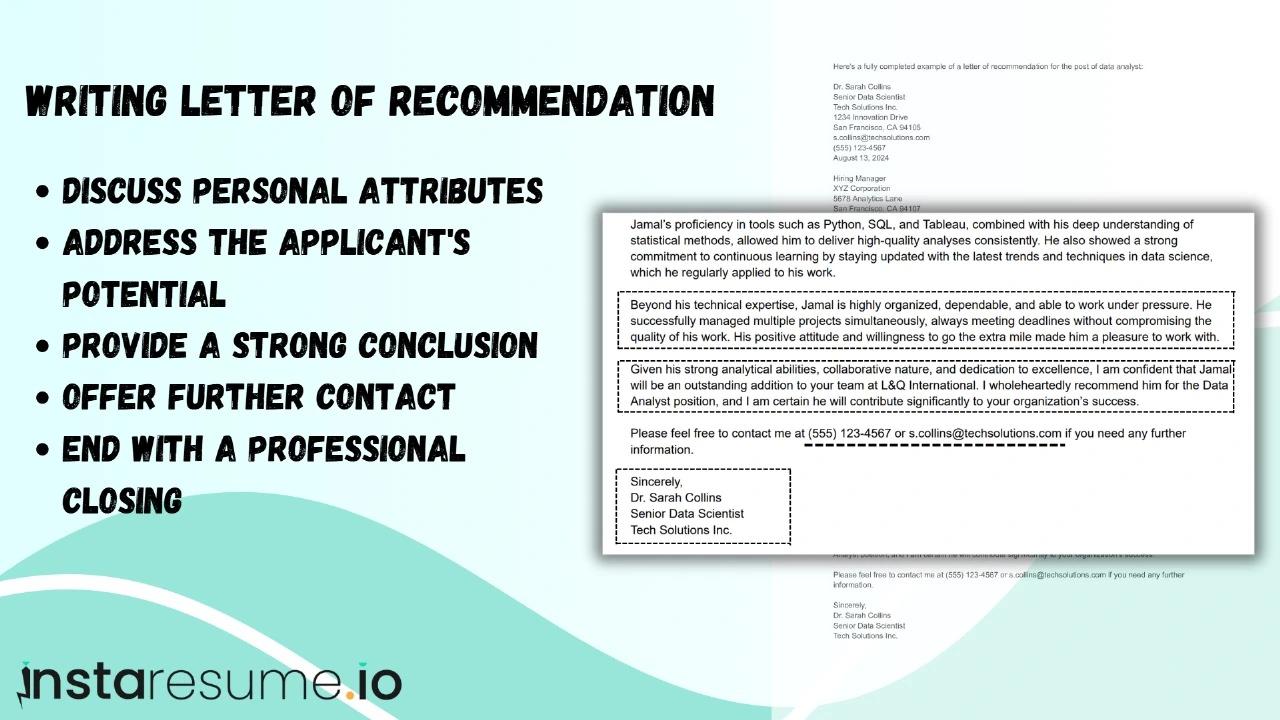Letter of Recommendation Examples
Trust Score: 4.7
358 reviews

Table of Contents
A letter of recommendation is a document written by someone who can speak to a person's abilities, character, and accomplishments. It is typically used in academic, employment, or professional contexts to support an individual's application for a job, scholarship, admission to an educational program, or other opportunities.
Key aspects of a letter of recommendation
 Who is writing?
Who is writing? The letter is usually written by someone who knows the applicant well, such as a teacher, professor, employer, supervisor, or colleague. The author should have a credible and relevant relationship with the applicant, which gives weight to their endorsement.
The letter is usually written by someone who knows the applicant well, such as a teacher, professor, employer, supervisor, or colleague. The author should have a credible and relevant relationship with the applicant, which gives weight to their endorsement.
 What is the purpose?
What is the purpose? The main purpose of the letter is to provide a third-party perspective on the applicant's qualifications, skills, and potential. It helps the decision-makers, such as employers or admissions committees, get a better sense of the applicant's suitability for the position, program, or opportunity they are seeking.
The main purpose of the letter is to provide a third-party perspective on the applicant's qualifications, skills, and potential. It helps the decision-makers, such as employers or admissions committees, get a better sense of the applicant's suitability for the position, program, or opportunity they are seeking.
 What shall be the content:
What shall be the content: A strong letter of recommendation will typically include:
A strong letter of recommendation will typically include: Introduction: The relationship between the recommender and the applicant, and the context in which they have worked together.
Introduction: The relationship between the recommender and the applicant, and the context in which they have worked together. Skills and achievements: A detailed account of the applicant's skills, accomplishments, and experiences, often with specific examples.
Skills and achievements: A detailed account of the applicant's skills, accomplishments, and experiences, often with specific examples. Personal qualities: Attributes such as leadership, teamwork, communication skills, and other personal qualities that make the applicant a strong candidate.
Personal qualities: Attributes such as leadership, teamwork, communication skills, and other personal qualities that make the applicant a strong candidate. Endorsement: A clear recommendation for the applicant, expressing confidence in their abilities and potential.
Endorsement: A clear recommendation for the applicant, expressing confidence in their abilities and potential.
How to write a letter of recommendation
Before knowing how to write a recommendation letter, one should understand when they can write a recommendation letter and when they should accept a request to write one.
Consider the following before you accept a request for a recommendation:
 Have you worked with or directly observed the applicant?
Have you worked with or directly observed the applicant? What projects did the person work on under my supervision?
What projects did the person work on under my supervision? Do you know relevant strengths and skills you can personally elaborate on?
Do you know relevant strengths and skills you can personally elaborate on? Do you have specific examples of the individual's work?
Do you have specific examples of the individual's work? Can you provide positive feedback about this individual?
Can you provide positive feedback about this individual?
If you don't have enough experience with positive comments to share about the applicant, let them know quickly and respectfully that you can't fulfill the request. This gives the candidate plenty of time to find an alternative solution.
Now that you have the perfect candidate for whom you can write a recommendation letter, you can follow the pattern below.
Writing a recommendation letter is a significant responsibility because it can greatly influence the recipient's future opportunities.
Here's a step-by-step guide on how to craft an effective and impactful recommendation letter:
Understand the purpose and context
 Know the audience: Understand who will read the letter (e.g., a hiring manager, an admissions committee) and tailor your tone and content accordingly.
Know the audience: Understand who will read the letter (e.g., a hiring manager, an admissions committee) and tailor your tone and content accordingly. Clarify the purpose: Determine why the recommendation is needed. Is it for a job, an academic program, a scholarship, or something else? Knowing this will help you highlight the most relevant qualities.
Clarify the purpose: Determine why the recommendation is needed. Is it for a job, an academic program, a scholarship, or something else? Knowing this will help you highlight the most relevant qualities.
Start with a strong introduction
 Introduce yourself: Begin by stating who you are, your role or position, and how you know the person you are recommending.
Introduce yourself: Begin by stating who you are, your role or position, and how you know the person you are recommending.
Example
 State the purpose: Clearly mention that you are writing to recommend the person.
State the purpose: Clearly mention that you are writing to recommend the person.
Example
Describe the relationship
 Contextualize your connection: Explain how you know the individual and for how long. This establishes your credibility as a recommender.
Contextualize your connection: Explain how you know the individual and for how long. This establishes your credibility as a recommender.
Example
Highlight key skills and qualities
 Focus on relevant strengths: Identify the key qualities, skills, and accomplishments that make the individual a strong candidate for the position or program.
Focus on relevant strengths: Identify the key qualities, skills, and accomplishments that make the individual a strong candidate for the position or program.
Example
 Use specific examples: Provide concrete examples that demonstrate the person’s abilities and character.
Use specific examples: Provide concrete examples that demonstrate the person’s abilities and character.
Example
Discuss personal attributes
 Mention character traits: Highlight personal qualities that make the individual a good fit for the role or program, such as leadership, teamwork, perseverance, or creativity.
Mention character traits: Highlight personal qualities that make the individual a good fit for the role or program, such as leadership, teamwork, perseverance, or creativity.
Example
Address the applicant's potential
 Express confidence: State your confidence in the individual’s ability to succeed in the new role or program.
Express confidence: State your confidence in the individual’s ability to succeed in the new role or program.
Example
Provide a strong conclusion
 Restate your endorsement: Reiterate your support for the applicant and make a strong closing statement.
Restate your endorsement: Reiterate your support for the applicant and make a strong closing statement.
Example
 Offer further contact: Invite the recipient to contact you if they need more information or wish to discuss the recommendation further.
Offer further contact: Invite the recipient to contact you if they need more information or wish to discuss the recommendation further.
Example
End with a professional closing
 Signature: Close the letter with a formal sign-off, such as "Sincerely" or "Best regards," followed by your name and position.
Signature: Close the letter with a formal sign-off, such as "Sincerely" or "Best regards," followed by your name and position.
Example
Dr. Emily Carter
Senior Lecturer, XYZ University
[Contact Information]
Types of letter of recommendation
Job applications
Importance of letter of recommendation:
In the competitive job market, employers seek more than just a candidate’s resume and cover letter. A letter of recommendation serves as a powerful endorsement from a previous employer, supervisor, or colleague, providing a third-party perspective on the applicant’s work ethic, skills, and contributions in previous roles.
Key elements:
 Work ethic: The letter can highlight the applicant’s dedication, reliability, and commitment to their job. For instance, it might mention how the individual consistently met deadlines, took initiative, or handled challenging situations with professionalism.
Work ethic: The letter can highlight the applicant’s dedication, reliability, and commitment to their job. For instance, it might mention how the individual consistently met deadlines, took initiative, or handled challenging situations with professionalism. Skills: The letter can detail specific technical or soft skills relevant to the job. For example, if applying for a project management position, the letter might focus on the applicant’s leadership, organizational abilities, and proficiency in project management tools.
Skills: The letter can detail specific technical or soft skills relevant to the job. For example, if applying for a project management position, the letter might focus on the applicant’s leadership, organizational abilities, and proficiency in project management tools. Contributions: The letter can discuss the applicant’s impact on the organization, such as successful projects they led, improvements they made, or any innovations they introduced. This provides concrete evidence of the value the applicant brought to their previous roles.
Contributions: The letter can discuss the applicant’s impact on the organization, such as successful projects they led, improvements they made, or any innovations they introduced. This provides concrete evidence of the value the applicant brought to their previous roles.
What impact a letter of recommendation has?
A strong recommendation letter can significantly bolster a job application by adding credibility and personal insight that resumes or interviews alone cannot convey. It reassures potential employers that the candidate has proven their abilities in real-world settings.
Academic applications
Dr. Elizabeth Harris
Department of International Studies
Global University
456 University Blvd
San Francisco, CA 94105
[email protected]
(555) 789-0123
August 13, 2024
Admissions Committee
Study Abroad Program
Prestige International University
789 Exchange Avenue
London, UK WC1N 1AA
Subject: Recommendation for Olivia Brown - Study Abroad Program
Dear Members of the Admissions Committee,
I am pleased to recommend Olivia Brown for the Study Abroad Program at Prestige International University. I have had the privilege of teaching Olivia in several courses at Global University, including "International Relations" and "Cultural Anthropology," and have witnessed her growth into a mature, intellectually curious, and globally minded student. I am confident that Olivia will thrive in an international academic environment and will contribute meaningfully to your program.
Olivia has consistently demonstrated a deep interest in global issues and cross-cultural understanding. Her academic performance has been exemplary, particularly in areas that require critical thinking and analysis of complex international dynamics. In our "International Relations" course, Olivia produced a research paper on the impact of global migration on cultural integration, which was not only insightful but also exceptionally well-researched. This paper was selected for presentation at our university’s annual student conference, where it received high praise from both faculty and peers.
One of Olivia’s most impressive qualities is her ability to adapt to new and challenging environments. She participated in a summer internship program in South Africa, where she worked with a local NGO focused on community development. During this time, Olivia demonstrated strong cultural sensitivity, adaptability, and the ability to work effectively in a diverse team. Her experience abroad not only enhanced her academic knowledge but also deepened her appreciation for different cultures and global perspectives.
In addition to her academic and extracurricular achievements, Olivia is a natural leader who actively contributes to our campus community. She serves as the president of the International Student Association, where she has organized numerous events that promote cultural exchange and foster a sense of global citizenship among students. Her leadership in this role has been instrumental in creating a more inclusive and globally aware campus culture.
I am confident that Olivia will excel in the Study Abroad Program at Prestige International University. Her academic achievements, leadership skills, and passion for global issues make her an ideal candidate for this opportunity. I wholeheartedly recommend her for admission and believe that she will make the most of this experience, bringing back valuable insights that will further enrich our university community.
Please feel free to contact me at (555) 789-0123 or [email protected] if you require any further information.
Sincerely,
Dr. Elizabeth Harris
Department of International Studies
Global University
Example highlights:
 Academic Excellence: Olivia produced an insightful research paper on global migration, which was selected for presentation at the university’s student conference.
Academic Excellence: Olivia produced an insightful research paper on global migration, which was selected for presentation at the university’s student conference. Cross-Cultural Experience: Olivia’s internship in South Africa demonstrated her adaptability and cultural sensitivity, enhancing her global perspective.
Cross-Cultural Experience: Olivia’s internship in South Africa demonstrated her adaptability and cultural sensitivity, enhancing her global perspective. Leadership: Olivia’s role as president of the International Student Association highlighted her leadership and commitment to promoting cultural exchange.
Leadership: Olivia’s role as president of the International Student Association highlighted her leadership and commitment to promoting cultural exchange. Global Mindset: Olivia’s deep interest in global issues and cross-cultural understanding makes her an ideal candidate for the study abroad program.
Global Mindset: Olivia’s deep interest in global issues and cross-cultural understanding makes her an ideal candidate for the study abroad program. Adaptability: Olivia's ability to thrive in new and challenging environments underscores her readiness for the challenges and opportunities of studying abroad.
Adaptability: Olivia's ability to thrive in new and challenging environments underscores her readiness for the challenges and opportunities of studying abroad.
Key elements:
 Academic achievements: The letter can highlight the student’s academic performance, including their grades, class rank, and any honors or awards they have received. It might also mention specific courses or projects where the student excelled.
Academic achievements: The letter can highlight the student’s academic performance, including their grades, class rank, and any honors or awards they have received. It might also mention specific courses or projects where the student excelled. Research and analytical skills: For graduate programs, especially in research-intensive fields, the letter can discuss the student’s ability to conduct research, analyze data, and contribute to scholarly work. It may include examples of research projects, papers, or presentations that the student completed.
Research and analytical skills: For graduate programs, especially in research-intensive fields, the letter can discuss the student’s ability to conduct research, analyze data, and contribute to scholarly work. It may include examples of research projects, papers, or presentations that the student completed. Potential for success: The letter often addresses the student’s potential to succeed in the desired academic program. This might involve the recommender expressing confidence in the student’s ability to thrive in a rigorous academic environment and contribute to the field of study.
Potential for success: The letter often addresses the student’s potential to succeed in the desired academic program. This might involve the recommender expressing confidence in the student’s ability to thrive in a rigorous academic environment and contribute to the field of study.
Professional certifications or memberships
Importance of letter of recommendation:
In certain professions, obtaining certifications or memberships in professional organizations is essential for career advancement. Letters of recommendation in this context support an individual’s application by attesting to their qualifications, experience, and adherence to industry standards.
Key elements:
 Professional experience: The letter can outline the applicant’s relevant experience in the field, including their roles, responsibilities, and achievements. This demonstrates their depth of knowledge and hands-on expertise in the profession.
Professional experience: The letter can outline the applicant’s relevant experience in the field, including their roles, responsibilities, and achievements. This demonstrates their depth of knowledge and hands-on expertise in the profession. Adherence to standards: The letter can vouch for the applicant’s commitment to ethical practices and professional standards, which is often a key consideration for certification or membership in a professional body.
Adherence to standards: The letter can vouch for the applicant’s commitment to ethical practices and professional standards, which is often a key consideration for certification or membership in a professional body. Continued professional development: The letter might also highlight the applicant’s dedication to ongoing learning and professional growth, such as participation in workshops, conferences, or additional training that enhances their expertise.
Continued professional development: The letter might also highlight the applicant’s dedication to ongoing learning and professional growth, such as participation in workshops, conferences, or additional training that enhances their expertise.
What impact a letter of recommendation has?
In industries where certification or professional membership is a mark of credibility, a strong letter of recommendation can significantly influence the approval process. It assures the certifying body or professional organization that the applicant meets the high standards required for recognition.
Volunteer or non-profit organization
Importance of letter of recommendation:
Letters of recommendation are also valuable in the non-profit and volunteer sectors. They are often used to support applications for leadership roles, grant applications, or even awards within these organizations.
Key elements:
 Commitment to the cause: The letter can detail the individual’s passion for the organization’s mission, as well as their dedication to volunteer work or community service.
Commitment to the cause: The letter can detail the individual’s passion for the organization’s mission, as well as their dedication to volunteer work or community service. Leadership and impact: It can highlight the individual’s leadership skills, including their ability to inspire others, organize events, or lead initiatives that have made a significant impact on the community or the organization.
Leadership and impact: It can highlight the individual’s leadership skills, including their ability to inspire others, organize events, or lead initiatives that have made a significant impact on the community or the organization. Personal qualities: The letter might emphasize qualities such as compassion, integrity, and teamwork, which are crucial in the non-profit sector.
Personal qualities: The letter might emphasize qualities such as compassion, integrity, and teamwork, which are crucial in the non-profit sector.
What impact a letter of recommendation has here?
A compelling recommendation letter in this context can help secure leadership positions, grants, or awards, by demonstrating the individual’s proven commitment and effectiveness in driving positive change within the organization or community.
Residency or internship programs
Importance of letter of recommendation:
For students or professionals entering fields that require practical training, such as medicine, law, or engineering, letters of recommendation are often required for residency or internship applications. These letters provide insight into the applicant’s readiness for hands-on training and their potential to succeed in a demanding environment.
Key elements:
 Clinical or practical skills: In fields like medicine or law, the letter can discuss the applicant’s clinical or practical skills, including their ability to apply theoretical knowledge in real-world settings.
Clinical or practical skills: In fields like medicine or law, the letter can discuss the applicant’s clinical or practical skills, including their ability to apply theoretical knowledge in real-world settings. Professionalism: The letter can address the applicant’s professionalism, including their ethical conduct, communication skills, and ability to work effectively as part of a team.
Professionalism: The letter can address the applicant’s professionalism, including their ethical conduct, communication skills, and ability to work effectively as part of a team. Capacity for growth: The letter can also highlight the applicant’s potential for growth and learning, which is critical in internship or residency programs where continuous development is expected.
Capacity for growth: The letter can also highlight the applicant’s potential for growth and learning, which is critical in internship or residency programs where continuous development is expected.
What impact a letter of recommendation has?
In competitive residency or internship programs, a strong letter of recommendation can distinguish an applicant by providing a detailed and personalized endorsement of their skills, work ethic, and suitability for the program.
Letter of recommendation format
Creating a well-structured layout for a letter of recommendation ensures clarity and professionalism. Here’s a simple yet effective layout you can use:
[Your Name]
[Your Title/Position]
[Your Organization]
[Your Address]
[City, State, Zip Code]
[Your Email Address]
[Your Phone Number]
[Date]
[Recipient's Name]
[Recipient's Title/Position]
[Recipient's Organization]
[Recipient's Address]
[City, State, Zip Code]
Subject: Recommendation for [Applicant's Name]
Dear [Recipient's Name],
1. Introduction
Start with a formal greeting and introduce yourself. Mention your position, the relationship to the applicant, and the purpose of the letter.
Example:
2. Describe the Relationship
Briefly explain how you know the applicant, including the duration and context of your relationship. This helps establish your credibility as a recommender.
Example:
3. Highlight Key Skills and Qualities
Focus on the applicant's relevant skills, achievements, and personal qualities. Provide specific examples to support your claims.
Example:
4. Discuss Personal Attributes
Mention the applicant’s character traits that make them a good fit for the position or program. This could include leadership, teamwork, dedication, etc.
Example:
5. Address the applicant's potential
Express your confidence in the applicant’s ability to succeed in their future endeavors. Reinforce why they are an excellent candidate.
Example:
6. Provide a strong conclusion
Restate your endorsement and offer to provide additional information if needed.
Example:
[Your Signature (if submitting a hard copy)]
[Your Name]
[Your Title/Position]
[Your Organization]
This layout ensures that your letter is well-organized and professional, making it easy for the reader to follow and understand your endorsement.
Letter of recommendation template
There are mainly three types of recommendation letters. Fortunately, you can use one simple format for all three types, which are for:
 Job Applications
Job Applications Academic Applications
Academic Applications Professional Certifications or Memberships
Professional Certifications or Memberships
To whom it may concern:
It is my pleasure to strongly recommend [Applicant Name] for [position with Company Name or acceptance to Institution Name].
I am [Your Name], a [Your Position] at [Institution or Company]. I have [number] years of experience working in [your industry or academic focus], and while I’ve worked with many people over the course of my career, [Applicant Name] is one individual who uniquely stands out.
During our time together, [Applicant Name] displayed great talents in [skill, trait, experience, class, etc.]. When we first met, I was immediately impressed with [Applicant Name], and as we worked together, [Pronoun] understanding of [key topic] grew far beyond that of [Pronoun] peers.
[Insert personal story elaborating on key skills, traits, or experiences].
It's not just [Applicant Name]'s technical skills that impress me. [Pronoun] was a joy to work with because of [Pronoun] amazingly positive attitude and [positive trait]. [Pronoun] [positive trait] and [positive trait] were valued not just by myself but also by [Pronoun] peers, who often relied on [Pronoun] to get the job done.
I am confident that [Applicant Name] would be a great fit for your [Institution/Company]. Not only will [Pronoun] bring the skills and experiences you’re looking for, but [Pronoun] will also quickly become an asset and help your [Institution/Company] grow in any way [Pronoun] can.
If you need more information or specific examples, please do not hesitate to contact me at [contact information]. As a recommendation letter likely only provides a snapshot of [Pronoun] talents and achievements, I would be happy to elaborate further on my time working with [Pronoun].
Sincerely,
[Your Name, Company, and Title]
Letter of recommendation example
Here's a fully completed example of a letter of recommendation for the post of data analyst:
Dr. Sarah Collins
Senior Data Scientist
Tech Solutions Inc.
1234 Innovation Drive
San Francisco, CA 94105
[email protected]
(555) 123-4567
August 13, 2024
Hiring Manager
XYZ Corporation
5678 Analytics Lane
San Francisco, CA 94107
Subject: Recommendation for Jamal Robinson - Data Analyst Position
Dear Hiring Manager,
I am writing to highly recommend Jamal Robinson for the Data Analyst position at L&Q International. As a Senior Data Scientist at Tech Solutions Inc., I had the pleasure of working closely with Jamal during his tenure as a Junior Data Analyst from June 2021 to July 2024. Throughout this period, Jamal consistently demonstrated exceptional analytical skills, a strong work ethic, and a keen eye for detail.
Jamal’s role at Tech Solutions involved managing and analyzing large datasets to derive actionable insights for our clients. One of his most notable contributions was during a project where he was responsible for analyzing customer behavior data to improve client retention strategies. Jamal not only excelled in cleaning and processing the data but also developed predictive models that accurately identified key factors influencing customer churn. His insights led to the implementation of targeted retention strategies, resulting in a 15% decrease in churn rate over six months.
In addition to his technical skills, Jamal is a proactive team player. He often took the initiative to collaborate with our software engineers and product managers, ensuring that data-driven decisions were seamlessly integrated into the product development process. His ability to communicate complex data insights in a clear and concise manner made him a valuable asset to cross-functional teams.
Jamal’s proficiency in tools such as Python, SQL, and Tableau, combined with his deep understanding of statistical methods, allowed him to deliver high-quality analyses consistently. He also showed a strong commitment to continuous learning by staying updated with the latest trends and techniques in data science, which he regularly applied to his work.
Beyond his technical expertise, Jamal is highly organized, dependable, and able to work under pressure. He successfully managed multiple projects simultaneously, always meeting deadlines without compromising the quality of his work. His positive attitude and willingness to go the extra mile made him a pleasure to work with.
Given his strong analytical abilities, collaborative nature, and dedication to excellence, I am confident that Jamal will be an outstanding addition to your team at L&Q International. I wholeheartedly recommend him for the Data Analyst position, and I am certain he will contribute significantly to your organization’s success.
Please feel free to contact me at (555) 123-4567 or [email protected] if you need any further information.
Sincerely,
Dr. Sarah Collins
Senior Data Scientist
Tech Solutions Inc.
Example highlights:
 Project impact: Jamal’s analysis led to a 15% decrease in customer churn, showcasing his ability to deliver actionable insights.
Project impact: Jamal’s analysis led to a 15% decrease in customer churn, showcasing his ability to deliver actionable insights. Technical proficiency: Strong skills in Python, SQL, and Tableau, essential tools for a Data Analyst.
Technical proficiency: Strong skills in Python, SQL, and Tableau, essential tools for a Data Analyst. Collaboration: Worked effectively with cross-functional teams, integrating data-driven decisions into product development.
Collaboration: Worked effectively with cross-functional teams, integrating data-driven decisions into product development. Communication skills: Ability to clearly present complex data insights to non-technical stakeholders.
Communication skills: Ability to clearly present complex data insights to non-technical stakeholders. Work ethic: Managed multiple projects simultaneously, consistently meeting deadlines without compromising quality.
Work ethic: Managed multiple projects simultaneously, consistently meeting deadlines without compromising quality.
Letter of recommendation writing tips
Here are some tips which you should use in writing the letter of recommendation:
Understand the purpose of the recommendation
Tailor your letter to the specific role, program, or opportunity the applicant is pursuing. Understand what the recipient is looking for in a candidate. Focus on the attributes, skills, and experiences that are most relevant to the opportunity. Avoid generalizations and emphasize specifics that align with the job or program.
Start with a strong introduction
Clearly state your name, position, and relationship to the applicant. Establish your credibility as someone qualified to recommend the applicant. Mention the purpose of the letter early on, specifying the role or program the applicant is applying for.
Be specific and provide examples
It is very important to know how to quantify your achievements.
Rather than making vague statements, provide specific examples of the applicant’s achievements, skills, and contributions. This could include successful projects, problem-solving instances, or leadership roles they’ve undertaken. Whenever possible, include numbers or metrics to demonstrate the applicant’s impact, such as “increased sales by 20%” or “led a team of 10 people to successfully complete a project ahead of schedule.”
Focus on key skills and qualities
Focus on the skills that are most relevant to the position or program. For example, for a data analyst role, emphasize analytical skills, proficiency with data tools, and problem-solving abilities. Mention traits like work ethic, leadership, teamwork, and communication skills. Personal qualities are often as important as technical skills, especially in team-oriented environments.
Keep it professional and positive
Maintain a professional tone throughout the letter. Avoid overly casual language or humor, as it may detract from the seriousness of the recommendation. Only endorse the applicant if you genuinely believe in their abilities. If you have any reservations, it’s better to decline writing the letter rather than providing a lukewarm recommendation.
Address potential weaknesses tactfully
If there’s a need to address a weakness, do so tactfully and in the context of how the applicant has overcome or is working on that weakness. Frame it positively to show growth and self-awareness. Mention specific steps the applicant has taken to improve in areas where they may have previously struggled, demonstrating their commitment to self-development.
Close with a strong endorsement
Conclude the letter by reiterating your strong support for the applicant. Clearly state that you recommend them for the position or program. Provide your contact information and offer to provide additional details if needed, showing your willingness to support the applicant beyond the letter.
Proofread and edit carefully
Proofread the letter multiple times to ensure there are no grammatical or typographical errors. A well-written letter reflects positively on both you and the applicant. Make sure your points are clear and well-organized so that the letter flows logically and is easy to read.
Consider the length
Aim for a length of about one page. While it’s important to be detailed, overly long letters can lose impact. Focus on the most important points, ensuring that each paragraph adds new information and doesn’t simply repeat what’s already been said.
Use a standard format
Use a standard letter format, including a header with your contact information, a formal greeting, the body of the letter, and a closing signature. Including a subject line, especially in formal or academic settings, helps clarify the purpose of the letter right from the start.
Letter of recommendation examples
Customizing a general recommendation letter according to common situations could help you better support the applicant's career development. Here are popular types of recommendation letters for specific situations:








